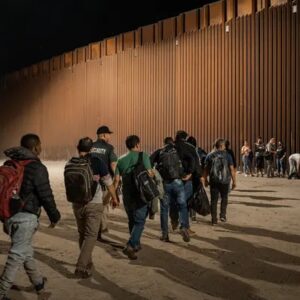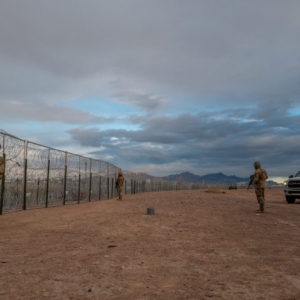FULL EVENT: Trump Gives Fiery Interview At National Association Of Black Journalists Convention Q&A

Trump addressed controversial remarks during an interview at the National Association of Black Journalists Convention, defending his record on black issues while facing tough questions about his past statements and policies. He emphasized his administration’s efforts on employment and education, while discussing immigration, inflation, and law enforcement issues affecting black communities.
The President defends his actions and statements regarding the Black community, claiming significant contributions to their welfare and employment opportunities. He emphasizes his past efforts for historically black colleges and entrepreneurship. The President highlights his initiatives, such as Opportunity Zones, which aim to create jobs and support Black entrepreneurs. He argues these programs have benefited the Black population significantly. He recalls the financial struggles of historically black colleges and universities, claiming he provided critical funding to support their operations. This highlights his commitment to educational institutions serving the Black community. The President addresses accusations of racism and hostility in his comments, suggesting that the manner of questioning reflects bias. He insists that he has always respected the Black community despite negative perceptions.
Inflation is severely impacting the working and black communities in the United States, leading to financial struggles and a diminishing American dream for many. Efforts are needed to address the rising costs and improve economic stability. The influx of immigrants is perceived to be taking jobs from black and Hispanic communities, contributing to rising unemployment rates among these groups. This situation raises concerns about labor competition and economic stability. The significant increase in individuals seeking credit counseling indicates a growing financial crisis, particularly among single black mothers. This highlights the urgent need for effective financial support systems. Rising inflation rates are affecting homeownership opportunities for young black individuals, making it difficult for them to achieve the American dream. Addressing energy costs and other inflationary pressures is crucial for economic recovery.
The discussion highlights the challenges faced by police officers in making split-second decisions and the implications of immunity in law enforcement. It raises concerns about public safety and the necessity for respect towards police. The distinction between bad behavior and innocent mistakes by police officers is crucial when considering cases for immunity and accountability within law enforcement. Recent incidents in Chicago, such as the 117 shootings and 17 deaths over the July 4th weekend, emphasize the urgent need for effective policing and community safety. The interview touches on the political implications of legal cases involving public figures, hinting at a perceived bias in the justice system against political opponents.
JD Vance’s journey from a challenging upbringing to becoming a successful senator showcases his resilience and dedication to working-class values. His story resonates with many who feel treated unfairly in society. Vance’s background demonstrates the impact of hard work and determination in overcoming personal challenges, which many can relate to. His ascent from a difficult family situation to Yale is notable. His military service for four years adds depth to his character, illustrating commitment and discipline, traits that resonate with voters looking for strong leadership. The discussion on the relevance of vice presidential choices highlights that voters primarily focus on presidential candidates, emphasizing the need for strong presidential leadership.
The abortion debate has shifted to state-level voting, allowing the public to decide. Many Americans support exceptions for rape, incest, and the life of the mother while opposing late-term abortions. The decision to overturn Roe v. Wade has resulted in states gaining more control over abortion laws, reflecting the public’s stance on this divisive issue. Most people, including many Republicans, believe in three exceptions for abortion, but they largely oppose late-term procedures, indicating a more nuanced view on abortion rights. Recent voting outcomes in states like Ohio and Kansas suggest a trend towards more liberal abortion laws, surprising many and showcasing the evolving public opinion on the issue.
There appears to be a significant disparity in how justice is administered in the U.S., particularly regarding different groups involved in protests and riots. This perceived injustice raises concerns about political motivations and fairness in the legal system. The speaker emphasizes the need for equal treatment under the law, mentioning high-profile cases of violence during protests. This highlights concerns about accountability for all individuals involved. A focus on border control and immigration policies is presented as a priority. The speaker argues that legal processes must be followed for immigration, contrasting with current practices. Economic issues are addressed, particularly rising grocery prices and the impact on everyday Americans. The speaker advocates for energy independence and lowering costs to ease financial burdens.
News
UNDEFEATED: Trump’s Popularity Reached Historic High 3 Months Before Election
Former President Donald Trump’s return to the White House appears smooth sailing as he enjoys a spectacular rise in favorability and approval ratings, nearing his strongest numbers…
Girls Freeze During Soccer Game As They Hear Unmistakable Sound
Parents at a high school soccer game were initially confused when every player on the field stopped playing and turned towards the left side of the field….
Illegal immigrants are offered an array of taxpayer funded benefits, enticing more to come: ‘Pull factor’
There have been more than 7 million migrant crossings during the Biden administration Illegal immigrants who have entered the U.S. as part of the record-breaking migrant crisis are…
Study says undocumented immigrants paid almost $100 billion in taxes
Study says undocumented immigrants paid almost $100 billion in taxes Texas National Guard soldiers stand on patrol near the bank of the Rio Grande on April 2,…
SUSSEX SCANDAL: Princess Anne Publishes Arc & Lili Adoption Records: Title Revoked & Funding Cut Off
Princess Anne has halted funding to Meghan Markle and Prince Harry’s Sussex charity amid allegations that question the authenticity of their children’s births. These claims suggest that…
BREAKING NEWS! Harry Confirms Divorce From Meg Due To Infidelity: I Made A Mistake MARRYING A WH0RE!
Prince Harry’s divorce from Meghan Markle has been deeply affected by allegations of infidelity, which were brought to light by Meghan’s mother, Doria Ragland. Doria uncovered evidence…
End of content
No more pages to load






